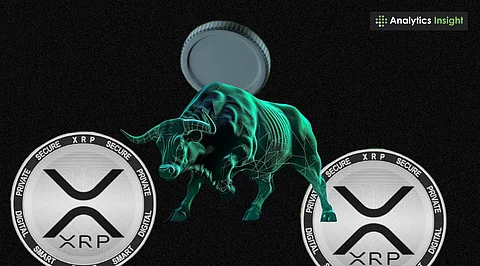

XRP Price has dropped to $2.87, down nearly 17% this month, with risk of falling further.
Whale sell-offs and weak blockchain activity signal ongoing selling pressure.
Federal Reserve policy uncertainty is dragging down XRP alongside other cryptocurrencies.
The XRP price is trading at around $2.87 at the time of writing. The price has been moving between $2.83 and $2.92 in the last 24 hours. This is a sharp fall from the July peak when XRP touched an all-time high of about $3.66. The overall market capitalization now stands close to $170.5 billion, while daily trading volume is near $3.3 billion.
In the last month, XRP has dropped almost 16.8 percent. Even in the short term, the losses have been consistent, with weekly declines between 6 and 11 percent. Chart patterns confirm this weakness. Analysts note that XRP has broken below a descending triangle pattern, which is a negative signal. If the trend continues, the next likely target could be $2.40.
One of the biggest warning signs is the formation of a descending triangle. This pattern often means a continuation of bearish momentum. The price falling below the lower support line increases the risk of a deeper fall. Losing the $3 mark was already a setback, as it showed that buying strength was fading.
Technical indicators support this view. The token is now trading below both the 20-day and 50-day moving averages. The Relative Strength Index shows bearish divergence, which means momentum is weakening even as price attempts to stabilize. Other indicators, like On-Balance Volume and the Money Flow Index, also suggest that sellers are dominating the market.
Also Read - Dogecoin and XRP Falling Fast: When Will They Hit Bottom?
Blockchain data gives more reasons to be cautious. In the last 30 days, large investors reduced their XRP holdings by nearly 80 percent. This is a clear sign of profit-taking, especially after the big rally earlier this year. At the same time, open interest in futures contracts dropped from $10.94 billion in July to $7.56 billion. This indicates that traders are losing appetite for speculation.
Transaction volume on the network has also fallen by 51 percent. The number of active addresses slipped by about 2.1 percent, leaving just over 107,000 active users in the past week. These figures show that activity on the blockchain itself is slowing down.
Another striking point is that more than 90 percent of the XRP supply is currently held at a profit. Historically, whenever such a high percentage of holders are in profit, mass selling usually follows. In early 2018 and again in 2021, XRP experienced steep corrections under similar conditions. Recently, large holders sold around 460 to 470 million XRP, dragging the price down from $3.50 to $2.80. While some smaller whales added to their positions, the overall movement is clearly toward selling rather than buying.
Global economic conditions are making matters worse for cryptocurrencies. The United States recently reported hotter-than-expected wholesale inflation. This lowered the chances of the Federal Reserve cutting interest rates soon. The probability of a rate cut fell from 94 percent to 85 percent. For risky assets like cryptocurrencies, this is negative because investors tend to avoid risk when interest rates remain high.
Whenever the Federal Reserve releases updates or when its members speak, markets react strongly. XRP fell by more than 4 percent during one such session when traders anticipated tighter monetary conditions. At another point, skepticism from the U.S. Treasury and disappointing wholesale data led to drops of between 3.8 and 5.2 percent across major cryptocurrencies, including XRP.
Thanks to this, the overall investor mood remains cautious. Until the Federal Reserve adopts a clear policy of reducing rates, risk appetite may remain low. That leaves cryptocurrencies exposed to further downside.
Liquidity analysis also shows XRP is in a difficult position. There are important liquidity zones between $2.63 and $2.68. The price has already tested these levels. If XRP fails to hold here, the chances of a bigger slide increase. On the other hand, strong resistance exists at $3.40 to $3.66, where the token has been unable to reclaim.
Market heatmaps and trading indicators point to a bearish internal structure. The daily charts show weakness reinforced by measures like the Directional Movement Index and On-Balance Volume. Analysts believe that if XRP falls below $2.85, then $2.74 and $2.63 could be the next support points. A breakdown under these levels could worsen the fall.
Although the short-term outlook is weak, there are some possible positive triggers for the future. A repeating fractal pattern on charts suggests that XRP might see a rally later this year. If whales re-enter the market and liquidity improves, the token could target between $4.35 and $4.85 in the fourth quarter.
There is also interest in XRP from global financial networks. The Society for Worldwide Interbank Financial Telecommunications (SWIFT) has been testing blockchain solutions and has identified XRP as a potential candidate for cross-border payment systems. This kind of adoption could provide long-term strength.
Still, the fact that 93 percent of holders are sitting on profits means the selling pressure is far from over. Profit-taking has been a recurring theme, and without a shift in sentiment, the market may see further corrections before any strong recovery.
The continued downtrend in XRP is the result of multiple forces acting together. On the technical side, bearish chart patterns and weak indicators point to more losses. On-chain data shows a heavy wave of selling from both retail and large investors. Globally, economic pressures such as high inflation and uncertain interest-rate policy are discouraging investors from betting on risky assets. Finally, liquidity analysis shows fragile support levels that may not hold if selling pressure rises further.
Unless there is a shift in global economic policy, renewed buying from institutions, or a significant boost in blockchain adoption, XRP may continue to decline. The risk of falling toward $2.40 remains high in the near term. A long-term rebound is possible, but only if the market finds stability and demand returns.
